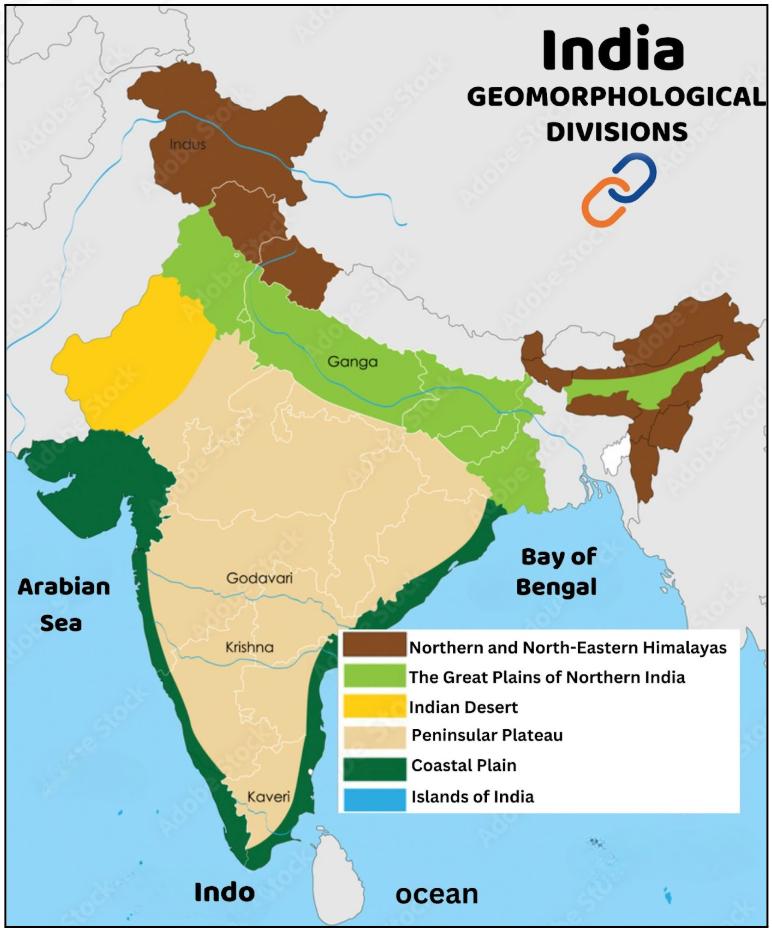In Indian Geography, India’s major physiographic divisions—Himalayas, Northern Plains, Peninsular Plateau, and Coastal Plains—shape diverse terrain and climate. From Himachal’s peaks to Tamil Nadu’s deltas, they influence settlement patterns.
Previous Year Question
| Year | Question | Marks |
| 2024 | Differentiate between ‘Malnad’ and ‘Maidan’ topography of Deccan Lava Plateau. दक्कन लावा पठार की ‘मलनाड’ और ‘मैदान’ भू-आकृतियों के मध्य अन्तर बताइये। | 2 M |
| 2024 | Differentiate between Western and Eastern Coastal Plains. भारत के पश्चिमी और पूर्वी तटीय मैदानों में अंतर कीजिए। | 5 M |
| 2023 | 2 M | |
| 2021 | How was the Shivalik Himalayas formed ? शिवालिक हिमालय का निर्माण कैसे हुआ ? | 2 M |
| 2021 | Write the names of Mountain Ranges/Hills of Western Ghats ? पश्चिमी घाट की पर्वत श्रेणियों / पहाड़ियों के नाम लिखिए ? | 2 M |
| 2018 | What is the importance of Chota Nagpur plateau ? छोटा नागपुर पठार का क्या महत्त्व है? | 2 M |
| 2016 | Explain the extent and importance of Chota Nagpur Plateau ? छोटा नागपुर पठार के विस्तार एवं महत्त्व का वर्णन कीजिए ? | 5 M |
| 2016 | Where are the ‘Sahyadris’ ? सहयाद्रि कहाँ हैं ? | 2 M |
| 2016 | Describe in detail the major areas of ‘Deccan Trap’ in India ? भारत में ‘दक्कन ट्रेप’ के प्रमुख क्षेत्रों का विस्तार से विवेचन कीजिए ? | 10 M |
| 2016 Special | Divide coastal plains of India into sub-divisions and explain their characteristics ? भारत के तटीय मैदानों को उप-विभागों में विभाजित कीजिए तथा उनकी विशेषताओं का वर्णन कीजिए ? | 10 M |
| 2013 | Differentiate between Bangar and Khadar regions of India ? भारत में बांगर एवं खादर क्षेत्रों में अन्तर स्पष्ट कीजिए ? | 5 M |
General Introduction
- The Indian subcontinent is a unique amalgamation of various topographies from the topography point of view. All these topographies are the combined result of geological movements and external factors that occurred at different time intervals.
- The present geological structure of the Indian subcontinent and its active geomorphological processes have come into existence mainly as a result of the interaction of endogenous and exogenous forces and horizontal movement of plates.
- On the basis of the difference in geological structure and rock group, India is divided into three geological blocks, which are based on physical characteristics-
- Peninsular segment
- Himalayas and other extra peninsular ranges
- Indus-Ganga-Brahmaputra plain
- The geological structure of a place is the result of the process and state of development. The surface variations in India are very important on the basis of which India is divided into the following physiographic divisions –
- Northern and North-eastern Himalayas
- The Great Plains of Northern India
- The Indian Desert
- The Peninsular Plateau
- The Coastal Plains
- The Islands of India

Major Physiographic Divisions of India / Major Physiographic Divisions of India / Major Physiographic Divisions of India / Major Physiographic Divisions of India / Major Physiographic Divisions of India
